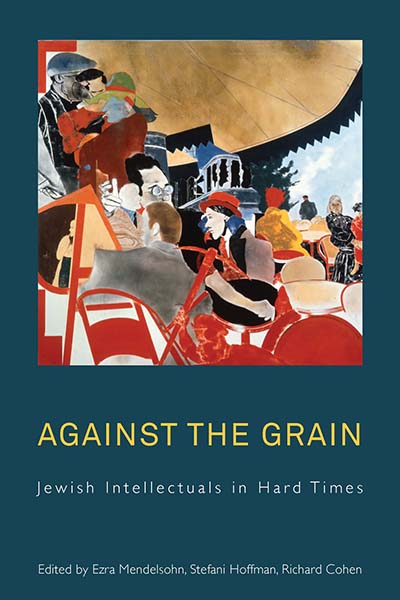German-Jewish intellectuals in the twentieth century are the focus of Against the Grain: Jewish Intellectuals in Hard Times, published this month. The volume, edited by Ezra Mendelsohn, Stefani Hoffman, and Richard I. Cohen, looks at the key figures of German-Jewish thought: Scholem, Strauss, and Kohn, and examines how such thinkers reacted to, and were impacted by, the collection of crises lived by Central European Jews. Below, co-editor Mendelsohn speaks about the volume’s potential to “stir” the field and what brought him to the study in the first place.
____________________________________________
Berghahn Books: What drew you to the study of the trials and tribulations of Jewish men and women in the twentieth century?

Ezra Mendelsohn: The main reason resides in my interest in the history of my own family. Both my parents were born in Tsarist Russia, and both ended up in the United States, having lived for some time in British Palestine.
They grew up in orthodox families but broke with religion and lived as secular Jews, identifying both with Jewish nationalism and socialism. Their lives were indeed full of “trials and tribulations,” and I was naturally attracted to this subject.
BB: Did any perceptions on the subject change from the time you started your research/compiled the contributions to the time you completed the volume?
EM: I had never seriously worked on German Jewish issues, but my friendship with Steven Aschheim and my desire to put together a collection of essays in his honor led me to this subject. Since I did not know much about it before I started work on the volume, I can say that during the years of making this volume I learned a lot, and I certainly found the subject more complicated and more nuanced that I had thought before I started.
To what extent do you think the book will contribute to debates among current and future academics within the field?
EM: I think that the collected essays certainly challenge accepted ideas about the course of modern German Jewish history, and in particular about the thought of a number of key intellectual figures, such as Gershom Scholem, Hans Kohn, and Leo Strauss.
BB: Do you think there are aspects of this work that will be controversial to other scholars in the field?
EM: It is quite possible – for example, received opinions about such figures as Hans Kohna Zionists who later abandoned Jewish nationalism, are challenged in this volume, and some readers will be surprised to read about Strauss’ interest in Marxist thought.
BB: What do you see as the greatest challenges facing the Jewish population in the twenty-first century?
EM: I suppose the obvious answer is, survival – and if the Jewish people does survive, what will be its major characteristics? Another great issue has to do with unity: how can a people with such a vast range of cultural, religious, and political views remain one?
BB: What is one particular area of interest or question, that hasn’t necessarily been the focus of much attention, which you feel is especially pertinent to your field today and in the future?
EM: The answer is, probably, the history of Jews from “the East,” meaning mostly from Moslem countries. Our volume does address, here and there, the issue of “orientalism,” but it deals with western Jews, as do most works on modern Jewish history and society.
______________________________________
Ezra Mendelsohn is Professor Emeritus at the Institute of Contemporary Jewry and in Russian Studies at The Hebrew University of Jerusalem. His most recent book is Painting a People: Maurycy Gottlieb and Jewish Art (2002).
Stefani Hoffman is the former director of the Mayrock Center for Russian, Eurasian, and East European Research at Hebrew University of Jerusalem. She is co-editor of Insiders and Outsiders: Dilemmas of East European Jewry (with Richard I. Cohen and Jonathan Frankel, 2010).
Richard I. Cohen holds the Paulette and Claude Kelman Chair in French Jewry Studies at The Hebrew University of Jerusalem. He has recently edited Visualizing and Exhibiting Jewish Space and History (vol. 26 of Studies in Contemporary Jewry, 2012).
